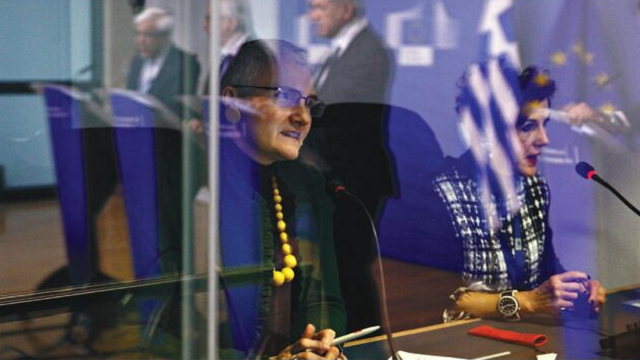-
QUALIFICATIONS
- For Linguists Worldwide
- For UK Public Services
- Preparation
- Policies & Regulation
-
MEMBERSHIP
- Join CIOL
- Professional Membership
- Affiliate Membership
- Chartered Linguist
- Already a member?
- Professional conduct
- Business & Corporate Partners
-
LANGUAGE ASSESSMENTS
- English
- All Other Languages
-
CPD & EVENTS
- Webinars & Events
- CIOL Conferences
- Networks
- CIOL Mentoring
-
NEWS & VOICES
- News & Voices
- CIOL eNews
- CIOL Awards
- The Linguist Magazine
- Jobs & Ads
-
RESOURCES
- For Translators & Interpreters
- For Universities & Students
- Standards & Norms
- CIOL & AI
- All Party Parliamentary Group
- In the UK
- UK Public Services
- Find-a-Linguist
Stamp of quality: CIOL Recognition, Validation and Certification (RVC)
Dom Hebblethwaite outlines a new initiative to validate and accredit courses around the world that meet CIOL’s exacting quality standards.
CIOL’s Recognition, Validation and Certification (RVC) Scheme is a new initiative. Introduced in 2021, it offers organisations delivering language education, vocational learning and assessments for linguists a formal means to achieve CIOL recognition and validation of their programmes and activities.
Why RVC?
A number of factors led to its creation. First and foremost is the ambition which opens the CIOL Royal Charter: to contribute towards international goodwill by encouraging the effective study and practice of languages. We have a global membership and offer our flagship qualifications around the world, but at the centre of the RVC Scheme is the belief that we can also promote languages and raise standards worldwide through partnership, expert review, advice, and formal recognition, validation and certification. With Zoom and online processes, we can reach more people and make a difference more than ever before.
Prior to RVC, we had been looking for effective ways to work with organisations in the UK and internationally, and we have had some success already with the Corporate and Business Partner scheme. At last year’s Council and Educational Trust Board (ETB) Strategy Awayday, the notion of expanding our use of endorsement and accreditation of language programmes really gathered momentum. This built on a series of Council and ETB ‘sounding boards’ and internal working meetings in 2020 and early 2021, where we discussed and developed a sense of what we could achieve by combining the best of what we do in both membership and qualifications – a process we have dubbed ‘One CIOL’.
The Royal Charter and professional standards
At the same time, we looked at another of the objectives in the Royal Charter: to provide linguistic assistance for and cooperating with any person or groups of persons interested in the use, teaching or study of languages. This provided a final spur. The importance of CIOL sharing and spreading quality and standards is regularly highlighted by stakeholders as a key distinguisher of CIOL, both as part of our membership ethos and as something that is built into our demanding professional qualifications. Marrying these ingredients together – and inspired by the models of British and International Standards (BSI and ISO) – we began a pilot scheme for recognition of language programmes by other organisations. In keeping with the activities expected of a professional body, these programmes are for adults who have moved beyond the beginner level.
Early Adopters
The first partner programme was Path Examinations, which runs ESOL (English for Speakers of Other Languages) exams in Latin America. CEO Pablo Demarchi says: “We already had local university and government recognition of Path as an organisation, but what was missing was external recognition of our language assessments. Now we can show people in Latin America and around the world that CIOL has checked and validated our adult ESOL assessments.”
Other early adopters include Ace English, the assessment arm of the English House network of language schools in and around Rome, and Grouphorse/Cema, which trains interpreters in China to work for the UN. RVC has also attracted a number of prestigious university programmes. Christophe Fricker, Bristol University’s MA Translation Programme Director, says: “For Bristol University there’s always merit in working with organisations that have similar clout. So I was very pleased to discover that the RVC Scheme is now available for our MA in Translation, and I think a strength of the scheme is that it brings together and contributes to a bigger benchmarking exercise.”
Other participants include one of Russia’s foremost universities, Tomsk State University, for its ELT Leadership MA; the University of Nottingham Ningbo campus for its language programmes; and the Sino-British university Xi’an Jiaotong-Liverpool (XJTLU), which, with over 200 teaching staff, is quite possibly the biggest language centre in the world.
Helen Beech, Interim Dean for the School of Languages at XJTLU in Suzhou, says: “The Chartered Institute of Linguists is both a national and international body and a lot of CIOL’s values align with our values, and we consider one of our graduate attributes here at XJTLU to be multilingualism. Aligning our programmes with the UK’s chartered body for linguists is prestigious for XJTLU as an institution and for the language centre.”

Pictured above (from left to right) Christophe Fricker from Bristol University, Helen Beech from XJTLU and Pablo Demarchi from Path Examinations.
Looking ahead, CIOL CEO John Worne adds: “Many of our partners have expressed interest in networking with other organisations that have joined the RVC Scheme. All the people we have worked with are running significant academic study or assessment programmes and face similar challenges. It could be a wonderful thing – a United Nations of language programmes.”
We have high hopes for the RVC Scheme, but what’s most important is that it’s another way for CIOL to rise to our mission, fulfil the expectations of our Royal Charter, and make our contribution towards spreading and sharing Universal Understanding.
More
The Chartered Institute of Linguists (CIOL), Incorporated by Royal Charter, Registered in England and Wales Number RC 000808 and the IoL Educational Trust (IoLET), trading as CIOL Qualifications, Company limited by Guarantee, Registered in England and Wales Number 04297497 and Registered Charity Number 1090263. CIOL is a not-for-profit organisation.








